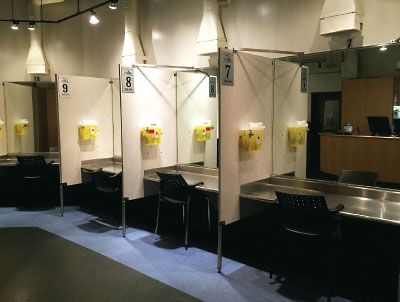Federal Judge Rules Safe Injection Site Is Legal
Abstract
Though the Justice Department said it plans to appeal, the case may open the door for other interested cities and states to open safe injection sites.
Last month a judge issued the first federal ruling on the legality of safe injection sites, finding that a Philadelphia organization’s plan to open such a site does not violate what is known as the “crack house” statute of the Controlled Substances Act.
Safe injection sites (also known as supervised injection or consumption sites) are designated spaces in which people can inject drugs under medical supervision. They’re meant to connect people to treatment while also preventing overdoses and the spread of infectious diseases. Though numerous such sites have opened in Europe and Canada, none are operating legally in the United States.

Injection booths have yellow boxes for disposing of used needles at Insite, a safe injection site in Vancouver, Canada.
Last month a judge issued the first federal ruling on the legality of safe injection sites, finding that a Philadelphia organization’s plan to open such a site does not violate what is known as the “crack house” statute of the Controlled Substances Act.
Safe injection sites (also known as supervised injection or consumption sites) are designated spaces in which people can inject drugs under medical supervision. They’re meant to connect people to treatment while also preventing overdoses and the spread of infectious diseases. Though numerous such sites have opened in Europe and Canada, none are operating legally in the United States.
Proponents of the sites argue that they are potential stopgaps to curtail the sharply increasing number of fatal drug overdoses. According to the National Institute on Drug Abuse, there were more than 70,200 drug overdose deaths in 2017, a twofold increase over the decade before.
“It’s very clear that when these sites are available, they are utilized by a fairly substantial number of people,” said Andrew Saxon, M.D., a professor in the Department of Psychiatry and Behavioral Sciences at the University of Washington School of Medicine, director of the Center of Excellence in Substance Abuse Treatment and Education at the VA Puget Sound Health Care System, and a member of APA’s Council on Addiction Psychiatry. He noted that available evidence largely relies on observational data. “These sites do seem to be a conduit for treatment for some people who are understandably leery about the health care system.”
The Justice Department sued Philadelphia-based nonprofit Safehouse in February after threatening last year to take “swift and aggressive action” against localities that open safe injection sites. (Psychiatric News).
In his decision, Judge Gerald McHugh of the United States District Court for the Eastern District of Pennsylvania pointed out that there is no evidence that Congress intended to criminalize safe injection sites when it passed a statute of the Controlled Substances Act meant to outlaw houses and buildings where drugs are made, used, or distributed. “The ultimate goal of Safehouse’s proposed operation is to reduce drug use, not facilitate it,” he wrote in his order.
The Justice Department has signaled its intention to appeal the ruling. In a letter addressed to Ilana Eisenstein, an attorney representing Safehouse, U.S. Attorney William McSwain said he would “use all enforcement tools” at his disposal to shut Safehouse down if it opens its facility before such an appeal process takes place, reported The Philadelphia Inquirer.
The case is being closely watched as it could have far-reaching implications for other cities also considering opening safe injection sites, such as New York, San Francisco, and Seattle.
In an October op-ed published in The Washington Post, Safehouse’s founders said, once it eventually opens, their facility will operate much like those in Canada, where there are numerous safe injection sites. People could come to the center and inject their own drugs with clean equipment while a health worker, who would neither touch nor distribute drugs, would be available to prevent overdoses or deaths. “This isn’t a substitution for treatment,” the founders wrote, “but it is safer than having people use drugs alone or on the streets.”
At Insite, a safe injection site in Vancouver, Canada, operated by Vancouver Coastal Health and PHS Community Services Society, more than 3.6 million clients have injected illicit drugs under supervision at the facility since 2003, according to the facility’s website. There have also been 48,798 clinical treatment visits and 6,440 overdose interventions without any deaths.
Saxon noted that, ideally, people who use injection drugs would get the highest-quality treatment available, but cost and workforce shortages are just two of the barriers to access. “But in the meantime, there’s no reason we can’t do the harm-reduction activities so fewer people die and fewer people get sick,” he said. ■



